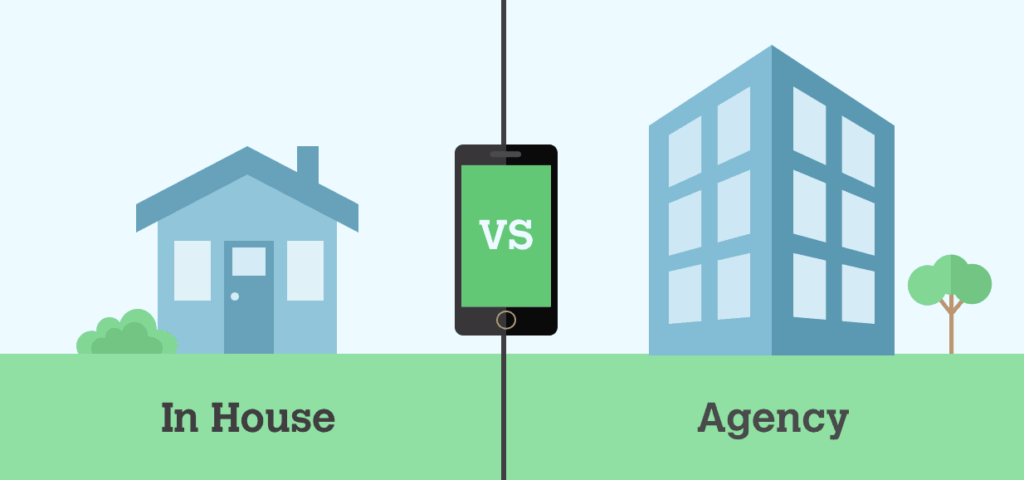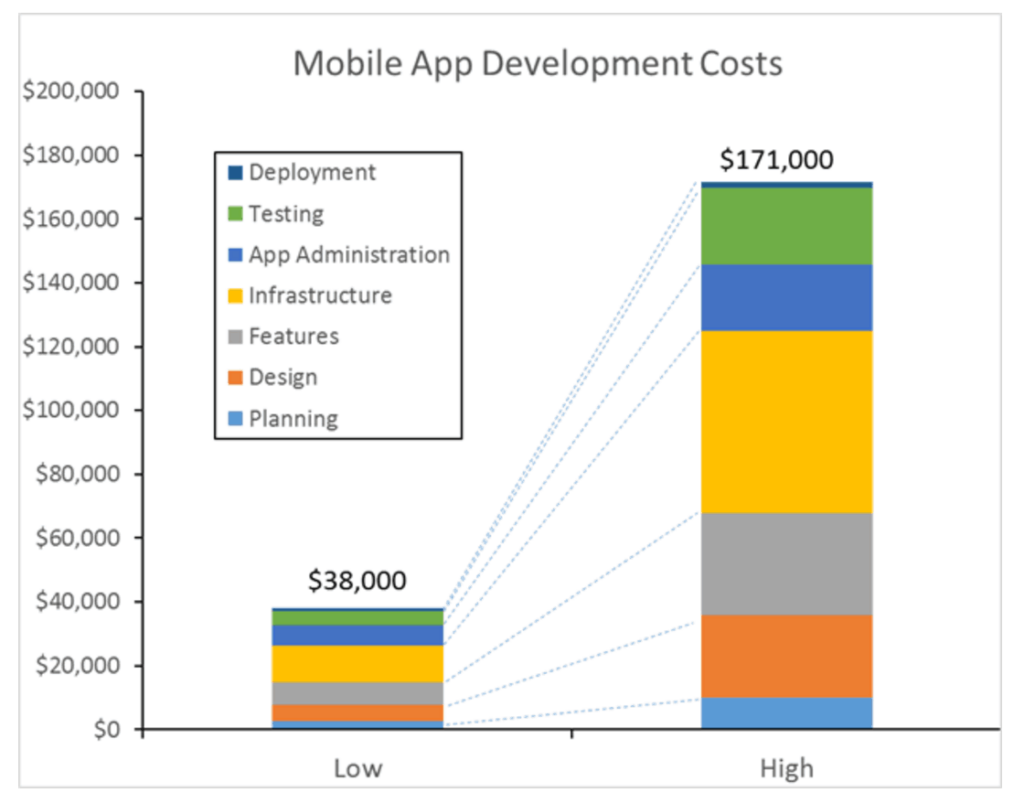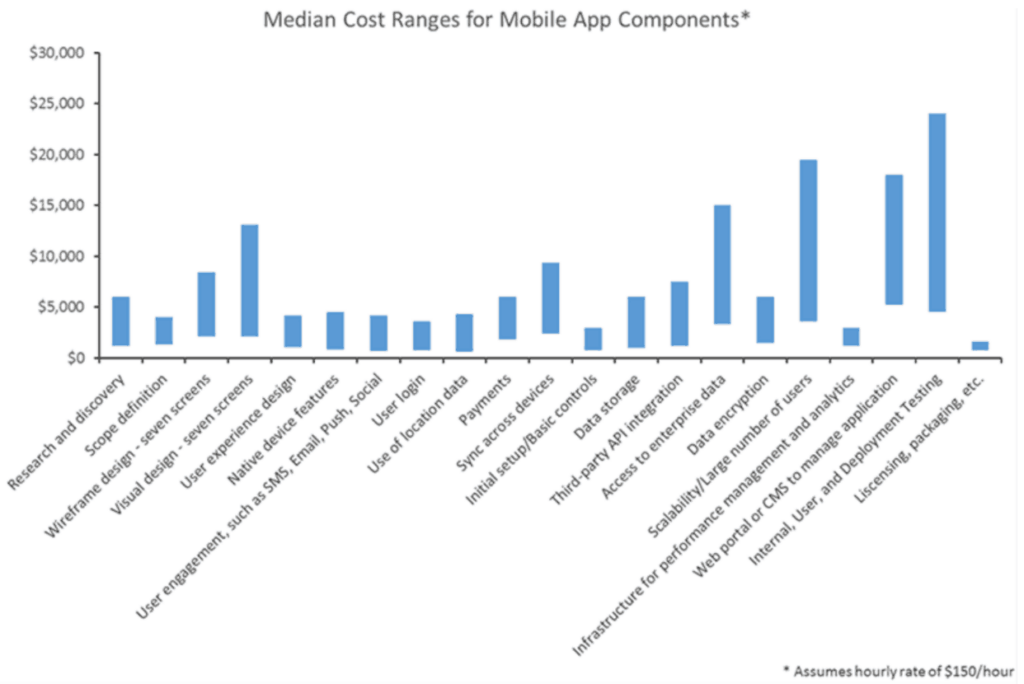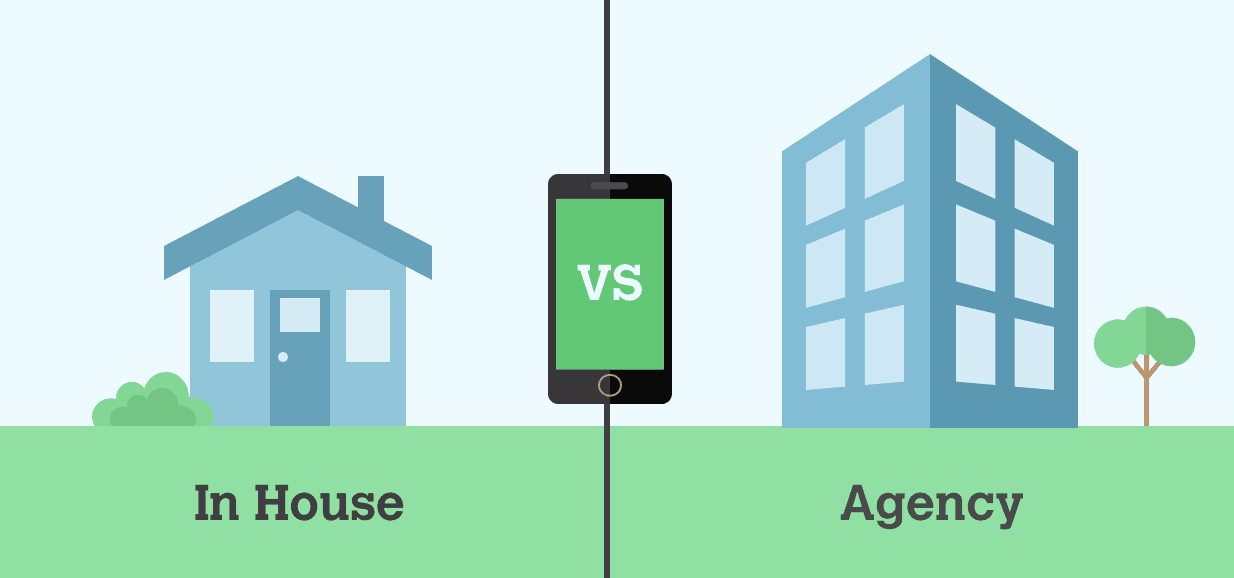A comprehensive resource highlighting the pros and cons of building an app in-house vs. choosing to outsource app development to a mobile app agency.

Your organization has decided to build an app, but you don’t know whether you want to outsource app development or build your own app internally. You’re stuck asking a question companies have pondered time and time again:
Who’s going to design, develop and launch our app?
It’s a question that has led to much debate in our industry. After taking clients through the MindSea Mobile App Blueprint process, we’ve advised some to build their own apps internally, and we’ve helped other clients go from idea to launch. As such, we’ve seen both sides and can say with confidence that there are pros and cons to both approaches.
Now, with research and insights from industry pros from around world, we’ve developed a go-to resource for making the decision between outsourcing to an app development agency and building your own app in-house. Whether you work for a big enterprise or have just founded a startup, we hope this guide will help you make the right choice for your company.
Let’s get to it.
Why You Should Build Your Own App In-House
Brand & Industry Knowledge vs. Time-Consuming Learning Curve
An internal team will always know more about your organization than a mobile app agency will. The internal team is going to have a better understanding of organizational politics, brand voice, target audience, vision, goals, history, and competitors. These insights are ingrained in the DNA of your organization and can only be passed along to an agency through collaboration and time.
The best app agencies will spend time learning about your customers, brand, goals and vision for the mobile app. The mind-meld won’t happen after one call; it will take time and effort for your and the agency to get on the same page and moving in a direction that will serve both parties in the long run.
Faster Sign-Off & Approvals vs. Process-Driven Approvals
It’s not always the case, but approvals usually happen faster if everyone involved is in the same physical location. The entire organization’s schedule and calendar can be synced, making it easy to lock in time for reviews without the back and forth of finding a time that works best for everyone. In addition, you have the luxury of chatting quickly about a design decision over lunch or in the break room.
When you work with a mobile app agency, sign-offs can happen quickly, but it requires a commitment from both the agency and the client. The myriad communication and productivity tools available today make it easier than ever to work with teams in different time zones, cities or countries. The best agencies will ensure that a process and project schedule are in place so that approvals happen on time without unnecessary delays.
Flexibility Revisions vs. Scope Creep
The biggest benefit of developing a mobile app in-house is having flexibility with revisions. The drawback to this situation is that you can spend countless hours tweaking, modifying and second-guessing product decisions without making meaningful progress.
When you work with an agency, there’s typically a set budget, and with this budget come constraints. You’re typically allowed a certain number of revisions and rounds of feedback at each step of the process. If you go beyond the set number of revisions, you’ll see an increase in the budget. Since the cost to build an app can vary depending on the needs of the project, this can quickly become a dealbreaker. Some agencies embrace an Agile methodology where you pay the agency for a set number of sprints as opposed to fixed scope, this offers more flexibility and more accurate estimates.
The opposite approach is leveraging an in-house team built from the ground up. In-house teams are on payroll, so there are no financial consequences if your team can’t make a decision. As a result, you might run into a challenge of actually launching your app on time while paying their salary regardless of any delays in the timeline.

Why You Should Hire A Mobile App Agency
Established Team Chemistry vs. New Team Dynamics
Most iOS app development and Android development agencies have teams of designers, developers, quality assurance engineers, and product managers who have worked together on multiple projects. Even if you already have one or two people on your team who have mobile experience, it’s likely the people you bring in to fill the gaps have never worked with your team before. As such, you’ll go through the growing pains that come with getting a new team on the same page. The team will need to learn each other’s strengths and weaknesses—things an agency team would already be familiar with.
Extensive App Experience vs. A Mix Of Backgrounds
An outsourced team likely specializes in mobile and will therefore have a greater understanding of the space than a generalist. The best app agencies use a variety of strategies to gain a better understanding of the app requirements, primary goals and priority features. From there, more experienced teams can leverage existing industry experience and the latest trends to offer a perspective that only comes from focus.
The Most Important Factor: Talent
Ultimately, identifying whether you want to hire an app agency or build an internal mobile team comes down to cost and risk. If you’re a larger company with thousands of employees, it might make sense to hire a mobile app agency to execute the entire project. If you’re a small startup that has yet to get funding or launch a product, you might want to bring in a few new founders to build the app with you.
It truly depends on your situation.
For example, according to 500 Startups founder Dave McClure, the ideal startup team should have three types of people: hackers who can code, hustlers who can manage and understand the business, and designers who can lead and implement design.
If you’re a larger company needing to build a scalable app, your team might consist of a larger group of talent that knows how to build an app. Some of the key roles you might want to look for include a product manager, app designer, iOS developer, quality assurance manager, user experience designer, user interface designer, API developer, Android developer and backend engineer.
Talent is the most important (and most expensive) part of the app development process—whether an agency is paying the wages or you are. The success of your app may hinge on finding the right talent for your team.
NOTE: If you decide to hire an app agency, here is a list of questions that you should ask before signing a contract.

How Much It Costs To Build An In-House App Development Team
Hiring great talent isn’t easy.
Research from OutSystems and Opinion Matters found that organizations are struggling to fill jobs for mobile developers—in fact, 63% of respondents had between 11% and 25% open vacancies for developers as a percentage of current team size.
Filling those vacancies takes time and money. Research from Deloitte found that U.S. companies are taking 52 days on average to fill open positions, and the cost to hire an individual—making job postings, conducting interviews, training staff and running background checks—is $4,000.
In addition to recruitment, it’s important to note that according to Indeed.com, the average app developer is making 77% more than the average worker—as of October 2016, the average salary for a mobile app developer in the U.S. is $102,000. Sure, that’s just one role on the team, but to get quality talent you can expect to shell out a minimum salary of $40,000 and a maximum salary in the six figures.
Let’s look at the type of team you should assemble and how much you can expect to pay.
Startup Team (1–4 People)

You already have a team that consists of developers and designers (maybe you’re one of them), and now you’re ready to build your mobile product. If you already have a team, it’s likely you’re either being paid through investor funding or have all agreed to invest your time and energy as sweat equity into the product. Since your team is small, you’ll probably have hybrid roles where your developers will need to learn on the job and designers will sketch, mockup and design every element of the product.
Small & Agile App Team (3–5 People)

In this scenario, it’s likely that you’re a venture-backed startup or mid-size company that needs a dedicated team to build an app. Unlike the startup approach, you will need to pay people with real cash. You may want to include a mix of both independent contractors and full-time staff in your HR mix. Here’s a sample slate of the roles you need and their salaries:
Mobile app developer: $81,000–$102,000
Mobile app designer: $61,000–$92,000
Product manager: $50,000–$120,000
Senior iOS developer (Part Time Contract): $20,000–$60,000
Total: $212,000 – $374,000
Ideal App Team (5–8 People)

You expect thousands of people to be using your app at launch, so you can’t afford to build a product with glitches or bugs—you’re striving for perfection. In this scenario, you don’t have time for mistakes and therefore need to build a team of heavy hitters to bring your app vision to life. Here’s what your ideal team might look like:
Mobile app developer: $81,000–$102,000
Backend developer: $85,000–$102,000
Lead UX designer: $85,000–$119,000
Mobile app designer: $31,000–$92,000
Product manager: $50,000–$120,000
Senior iOS developer (Part Time Contract): $25,000–$65,000
Senior Android developer (Part Time Contract): $25,000–$65,000
Quality assurance engineer (Part Time Contract): $10,000–$45,000
Total: $392,000 – $710,000
Costs For Payroll & Taxes
In addition to the salaries of these team members, you’re going to be on the hook for other costs such as taxes, unemployment and healthcare. Every country, state and province has different laws about these items so be sure to check with your local government to get a clearer picture of your expected costs.
US Taxes By States – Canada Taxes
Overhead Costs For An In-House Team
The cost of hiring and building an in-house team doesn’t end with their contracts. You need to offer your employees a work environment that is both rewarding and enjoyable. Every hire is going to incur additional costs, such as:
- Hardware requirements (laptop, test phones and tablets, etc.)
- Software requirements (Photoshop, Illustrator, InvisionApp, etc.)
- Office space (and supplies) or tools for remote communication
How Much It Costs To Hire An App Development Agency

According to 12 leading mobile app development companies on Clutch, the median cost for an agency-developed mobile app ranges from $37,000–$171,000, but could climb to more than $500,000. A combination of factors contributes to the wide price discrepancy for app development:
- Agency team experience: If an agency is still relatively new in the industry and has yet to build a quality portfolio, it’s likely that they will take projects with smaller budgets. On the flip side, agencies with extensive experience are likely to charge more because their of portfolio, past results and need to cover higher wages.
- Agency team size: Some projects don’t require large teams for app development, and those come with a smaller budget.
- App complexity: An application that connects with multiple APIs, requires user login, online payment, GPS and a handful of other bells and whistles is going to cost much more than a simple photo filter app.
- Backend scalability: When building an app, it’s not easy to predict the architecture that may be required to support an unknown number of users. You could take the single-server architecture approach, but this can cause issues if you have 400 or 500 users at the same time. Therefore, you need to consider a multi-server cloud architecture which is easier to scale when an influx of users or data comes in; however this approach could increase your budget.
- Agency location: A 20-person app agency located in India is likely to cost much less than a 20-person app agency in the heart of downtown New York City.

According to Clutch, five line items in the app development process had a wide range (50-plus hours) between the median high and median low values:
- Visual design
- Access to enterprise data
- Backend built for scalability of users
- Web portal or CMS to manage application
- Internal, user and deployment testing
These numbers illustrate the significant differences between agencies. Some app agencies spend 60 hours on visual design, and others are more likely to spend 10. Some agencies will spend 20 hours on testing while others spend 70. So know that your expected costs to build an app all depend on the agency, their expertise and of course, the project.
What Will You Choose?
When you compare hiring an app agency to develop a mobile app vs. building a team to build your own app in-house, it’s easy to see that what might be good for one company might not be good for the next. Outsourcing could be a more cost-effective and risk-free approach for a one-time build, while an internal team might make more sense long-term if you’re developing a scalable product that will be frequently updated.
Luckily, you don’t have to pick one or the other when it comes to launching your mobile app. In today’s world, many agencies (MindSea included) offer a hybrid approach where certain tasks are outsourced while others are maintained internally. In addition, we’ve also built apps to help clients get to market quicker and then hand it off to an internal team for ongoing maintenance and iterations.
One of our most popular service offerings is the Mobile App Blueprint, a process focused on research, planning, design and prototyping to give teams everything they need to develop an app that will resonate and succeed.
Want to see the results that are possible with an app agency that can help you go from idea to launch—or simply lay the foundation you need to build in-house? Schedule a free consultation with one of senior app strategists today.



